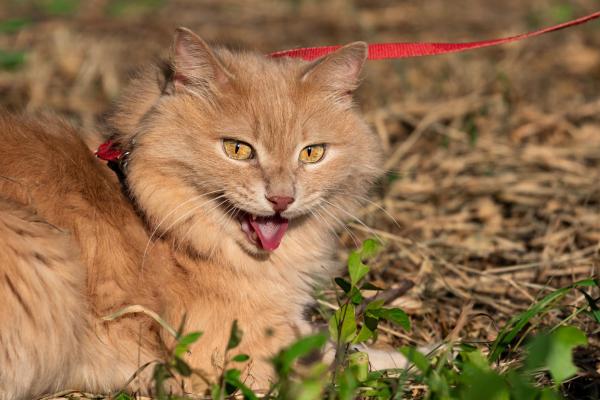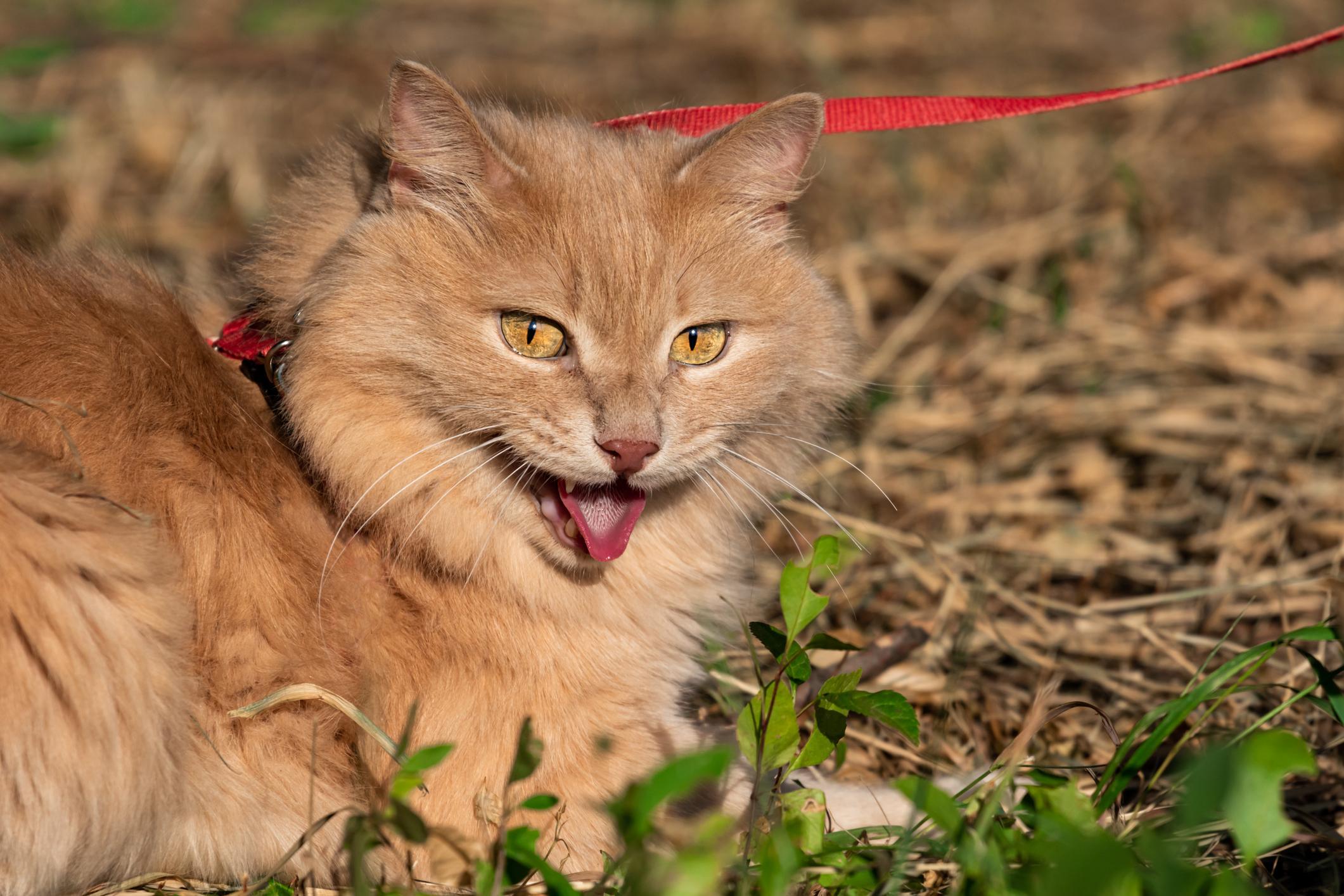Heavy Breathing in Cats - Causes and Solutions



See files for Cats
Respiratory tract diseases are a major cause of morbidity and mortality in cats and one of the main reasons for visits to the veterinary hospital. Although upper respiratory tract infections are common in cats and rarely result in death, lower respiratory tract disease can be fatal. Cats that breathe heavy are considered emergencies and should be taken to a veterinarian immediately. You should always be aware of your cat's breathing, if their nose is stuffy, and if their mucous membranes change their color.
This AnimalWised article explains why your cat is breathing heavily and what you can do about it.
What is heavy breathing in cats?
Panting and heavy breathing are more commonly associated with dogs than with cats. However, there are situations when it is normal for your cat to pant. Sometimes, however, it can also be a sign of a serious condition that requires immediate veterinary attention.
Unlike dogs, cats do not pant to cool down unless they are severely overheated. For example, if your cat is panting after playing, it is almost never normal. Cats sometimes pant when they are extremely stressed. Although this may not sound dangerous, you should try to find out why they are stressed and what you can do to improve the situation.
Exercise can cause a cat to breathe rapidly, but this should quickly return to normal at rest. The only time heavy breathing is normal in cats is after strenuous exercise. Heavy breathing at rest, other than an occasional deep sigh, indicates dangerous health problems such as heart failure or severe lung disease.
The most common signs of heavy breathing in cats include:
- Loud breathing
- Choking
- Fatigue or lethargy
- Rapid rising and falling of abdomen or chest
- breathing with mouth open
- Cough
- Blue colored gums
If you notice that your cat is breathing heavily, start assessing the situation by following the criteria that we will explain throughout this article. Take your cat to the veterinarian if the labored breathing is unusual or has been going on for a long time. Do not attempt any maneuvers or use home remedies, as this may stress the animal and cause further damage.
Why is my cat heavy breathing?
The respiratory system of a cat consists of many parts, including the nose, pharynx (pharynx and larynx), trachea, and lungs. Diseases of any part of this system or of the respiratory center in the brain can cause respiratory problems in cats. In cats, heavy breathing can be caused by a number of factors, most of which pose a significant threat to their health. Some of these factors are:
Asthma
Asthma is one of the most common respiratory diseases in cats and a common cause of respiratory problems. The disease is characterized by inflammation of the lower airways, possibly due to an allergic cause.
Exposure to allergens such as air pollution, cigarettes, incense, house dust, sanitary dust granules, flea powder, perfume, herbs, and plant pollen can cause inflammation of the airways. Such inflammation can lead to cough, enlarged airways and dyspnea. In this case, it is often observed that the cat breathes very fast.
Stuffy nose
Some viral pathogens, such as feline herpesvirus type 1 and feline calicivirus, are responsible for upper respiratory tract disease in cats. Symptoms may vary depending on the severity of infection and include sneezing, runny nose, cough, conjunctivitis, ocular discharge, corneal ulcers, and oral lesions.
Nasal secretions may accumulate and dry out, making it difficult for the animal to breathe. Bacterial pathogens may also be involved, leading to an exacerbation of the disease that may develop into pneumonia.
Pneumonia
Pneumonia may be due to infectious causes or, less commonly, to noninfectious causes. Infectious agents associated with pneumonia in cats include bacteria, viruses, fungi, and parasites. Noninfectious causes are associated with aspiration pneumonia, inhalation of toxic or irritating substances, and endogenous lipid disorders.
Lower respiratory tract infections primarily affect young cats. In adult cats, they are considered a rare condition and are usually associated with predisposing factors that lead to systemic immunosuppression. These include: feline leukemia virus (FeLV) and feline immunodeficiency virus (FIV), endocrine disease and/or metabolic disease, or immunosuppressive therapy with chemotherapy or corticosteroids.
Pleural effusions
A pleural effusion is an accumulation of fluid in the pleural space. A disturbance in the production or excretion of this fluid results in an excessive accumulation of fluid. This impairs lung function and results in limitation of lung expansion and ventilation. Several etiologies can cause this change, such as feline infectious peritonitis, mediastinal neoplasms, congestive heart failure, among others. Pleural effusion puts the life of the cat at risk, which must be taken to the veterinarian as soon as possible.
Congestive heart failure
Congestive heart failure is a condition in which a cat's heart cannot adequately supply blood to the body. Symptoms include rapid or difficult breathing, weakness, lethargy (fatigue), and loss of appetite. Diagnosis to determine the underlying cause may include blood tests, radiographs (or x-rays), and echocardiograms. Medications can help improve the cat's quality of life and prolong survival.

What to do if my cat is heavy breathing?
Heavy breathing in cats should never be ignored. Make an appointment with your veterinarian unless your cat has just run a few laps around the house or experienced something stressful (and it quickly returns to normal).
In most cases, the causes of heavy breathing in cats are quite serious. Also, unlike other pets, cats are very good at hiding the fact that they are sick or injured. This means that they are often already on the verge of a crisis when their heavy breathing is noticed.
It's best to see a veterinarian immediately if your cat is experiencing severe symptoms, even if that means driving to an emergency clinic at night. Cats with severe breathing problems may be on the verge of collapse. Stay calm, but get them into a carrier quickly and to a nearby veterinarian.
You may also be interested in this other article where we explain what dyspnea in cats is, the causes and treatment.
How to help my cat breathe better?
Below, we give you our tips on how to help your cat breathe better:
- If you notice that your cat is breathing poorly, you should first check to see if a secretion or foreign body is obstructing the passage of air through the nostrils. If this is the case, do not hesitate to visit the veterinarian.
- If the cat has the flu, clean the nostrils with warm saline and gauze, carefully so as not to injure the nose.
- If the nose is clear and no sounds are heard when breathing, but the cat still seems to be breathing poorly, the problem may be in the lower airways (lungs). In this case, imaging studies and a good evaluation by the veterinarian are needed.
- If your cat has a respiratory infection, it may be difficult for her to breathe normally. Antibiotics may be needed to treat your cat's condition, so they can breathe easier. Humidifiers and steam can help loosen mucus and ease nasal breathing while your cat recovers.
You may also be interested in this other article, where we explain why your cat gasps when breathing.
This article is purely informative. AnimalWised does not have the authority to prescribe any veterinary treatment or create a diagnosis. We invite you to take your pet to the veterinarian if they are suffering from any condition or pain.
If you want to read similar articles to Heavy Breathing in Cats - Causes and Solutions, we recommend you visit our Breathing diseases category.
- Slavieiro, M. (2021). Pathological and etiopathological characterization of pneumonia as a cause of death in cats . Federal University of Rio Grande do Sul, Faculty of Veterinary Medicine. Available at https://www.lume.ufrgs.br/bitstream/handle/10183/221695/001125362.pdf?sequence=1&isAllowed=y.
- Tadeu, JM (2017). Pleural effusions in cats . Federal University of Rio Grande do Sul, Faculty of Veterinary Medicine, 2017. Available at file:///C:/Users/carlamoreira/Downloads/001053408.pdf.
- They said, A. (2019). Asthma and chronic bronchitis in domestic cats . Federal University of Rio Grande do Sul, Faculty of Veterinary Medicine. Available at https://www.lume.ufrgs.br/bitstream/handle/10183/200184/001102893.pdf?sequence=1.
- Becker, AS (2019). Molecular detection of feline alphaherpesvirus 1 and feline calicivirus in domestic cats . Federal University of Pelotas, Faculty of Veterinary Medicine. Available at https://wp.ufpel.edu.br/ppgveterinaria/files/2020/09/Alice-Silveira-Becker.pdf.






